By Francisco Marcos
This post surveys the status of cartel litigation in Spanish courts, updating data on the progress of damages claims in the truck cartel, the growing damages claims in the automobile cartel, the revival of claims in the paper envelope cartel, with the filing of a curious “torpedo action” against potential claimants by one of the cartelists, pending claims in the milk processors, cardboard and cable cartels, and the first follow-on actions by the Public administration seeking compensation of the cartel overcharges. Forthcoming judgments of the Supreme Court are expected to further clarify the criteria for judicial assessment of the expert reports quantifying cartel overcharges in relation to the power of judicial estimation (overcoming the divergent views of the lower courts on the same reports in hundreds of cases), but in some cases litigation is fraught with doubts about the statute of limitations, something the Supreme Court (or even the CJEU) will need to rule on in the future.
Introduction
The Opinion issued by A.G. Julianne Kokott a few days ago (C‑605/21, Heureka Group a.s. v Google LLC, EU:C:2023:695) opens the floodgates for pending and forthcoming claims against Scania in Spanish Courts (see pars. 62-70). That would pile-up hundreds of further damages awards in favor of those harmed by the truck manufacturers cartel. Spanish Courts of Appeal have already awarded around €150 million in claims concerning aproximately 14.000 cartelized vehicles.
However, the Spanish cartel damages scene goes well beyond the truck cartel. As proof of the vibrancy of litigation in this field, commercial courts in Spain are not only dealing with truck cartel damages cases (this post updating the data and figures on the case below) but they are also deciding damages claims in the automobile cartel and the milk processors cartel. Aside from those cases, there are interesting developments in the revival of follow-on claims in the paper envelopes cartel (with a singular “torpedo action” filed by one of the cartelists), interesting forms of preventive litigation by defendants on the cable cartel and the first claims by public administrations harmed by cartels.
Update in Truck cartel damages claims
After the Supreme Court delivered its first judgments in the case last June, deciding in cassation the final appeals on the “first wave” of claims with damages awards of 5% of the purchase price of the cartelized trucks (given that the claimants had not supported their petitions with a proper expert report). I commented on the judgments here.
The Supreme Court endorsed the “conservative” estimate of the overcharge by lower courts, providing further guidelines for ascertaining the way ahead in the pending cassation appeals. A level of compensation of 5% seems to be the damages floor, awards exceeding that minimum being possible only if the claimant proves that the overcharge was higher, considering also any alternative quantification presented by the defendant.
New rulings by the Supreme Court are expected soon, in which the highest court will surely clarify the criteria for judicial assessment of the expert reports quantifying cartel overcharges in relation to the power of judicial estimation of harm (overcoming the divergent views of the lower courts on the same reports in hundreds of cases, see below).
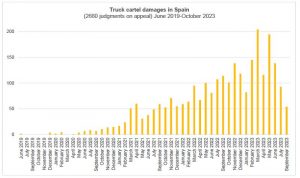
Up to now, forty-six courts of appeal have issued 2622 judgments (90,6% available in CENDOJ), with the Audiencia de Oviedo as the court that has delivered most judgments (253). In general, courts of appeal almost always side with the claimant (94%): there have only been 140 dismissal judgments, mainly due to plaintiff’s insufficient proof of the level of quantum claimed
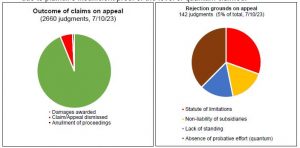
Litigation is very fragmented, with few large claims. The majority of rulings by Courts of appeal have decided on individual claims (68,3%), and 45% of all judgments decided have concerned claims for the overcharge paid in three or less trucks.
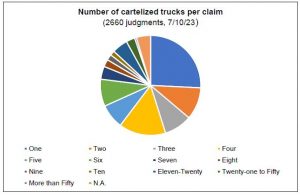
Five percent compensation is the most popular award among appellate courts, although more than half of them have awarded higher compensation, either a higher percentage of the purchase price of the truck or an alternative calculation based on the compensation requested by the injured party. Although, there are indications that future judgments of the Supreme Court are likely to confirm the awards granted by lower courts (including full damages awards, see lately here, here and here). However, it does not seem that this solution can be extended to all pending cassation appeals, since it would mean the confirmation of disparate awards in identical cases (although this is what happened with the awards in the paper envelopes cartel -see below-, where the inadmissibility of cassation appeals by the Supreme Court has allowed for a divergence of more than double in the awards granted to victims in analogous circumstances).
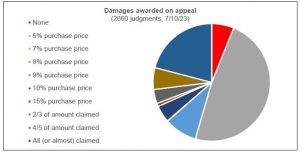
Automobile Cartel damages claims
A leniency application by the automobile manufacturer SEAT led to the detection of a cartel among automobile manufacturers, which was fined in 2015 by the CNMC with fines totaling €131.446.366 (S/482/13 fabricantes de automóviles). The High National Court and the Supreme Court confirmed the existence of the infringement and the fines imposed. The infringement has complex features regarding its duration and the participation of the manufacturers in the different forms of collusion (see my analysis here) and this may have an impact in how/whether automobile buyers experienced any harm (in particular, concerning any claims for joint and several liability of the infringers).
In the last year or so, litigation on this case has gained speed, “helped” by the use of oral summary proceedings (juicio verbal) in the handling and management of the claims in court, as the “preponderant (exclusive) aspect of the claim is the quantification of the damage («claim for an amount»), so that the amount of the claim must govern the choice of the procedure to be followed” (Supreme Court Order of 13/10/22, BMW Ibérica, rapp. P.J. Vela, ES:TS:2022:13976A, see article 249.1.4º and 250.2 of Civil Procedure Act). Oral summary proceedings are express and fast-track trials, without the prior hearing that exists in ordinary proceedings, and no (or limited) appeals on these cases (see article 455.1 of Civil Procedure Act, appeals only for amounts over €3.000).
Rules on jurisdiction allows these claims to be filed in the courts of the domicile of the defendant, in the courts of the place where the vehicle was purchased and in the courts of the domicile of the consumer (if she was the acquiror, inter alia ES:TS:2022:13976A, ES:TS:2022:13977A, ES:TS:2023:1609A, ES:TS:2023:7606A and before the Supreme Court rulings see also ES:JMM:2022:2249A, ES:JMV:2022:1573A, ES:JMB:2023:322A, ES:JMPO:2022:25A). That has led, in a similar manner to the litigation in the truck cartel, to the claims being filed in all the courts within the Spanish territory. At least forty-eight commercial courts across Spain have issued 277 judgments on the merits (68% publicly available in CENDOJ).
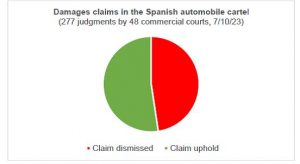
Up to now, the outcome of litigation has been 52% in favor of claimants, with 48% of rulings having dismissed the claims on various grounds. All the suits have been individual actions, claiming the overcharge paid on a single car. Although some collective suits could be forthcoming, efforts by prospective claim-organizers to access to data from tax (Agencia Tributaria) and traffic (DGT) authorities that would be used in their construction, have been unsuccessful (see, for example, Orders of Audiencia de Madrid -sec. 28- of 24/2/23, OCU, Rapp: A. Galgo, roll 2051/22; Audiencia de Zaragoza -sec. 5- of 1/7/21, OCU, MP: AMª. Martínez, ES:APZ:2021:1149A and juzgado mercantil 11 de Barcelona -JMª Fernández of 12/1/22, OCU, ES:JMB:2022:59A).
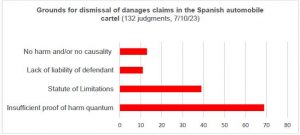
As in the truck cartel, most of the dismissals in this case have also been due to the evidentiary weakness of the quantification of harm by claimants or to the claims being time-barred. However, after the first Supreme court judgments on the truck cartel last June, it could be that insufficient proof of the quantum of the award by claimant is no longer a ground for dismissal of these claims (see the judgments of 5/7/23 of Audiencia de Zaragoza of 5/7/23, N v. Opel, ES:APZ:2023:1208, rapp. A. L. Pastor, and Audiencia de Madrid of 21/7/23, Maqueda Gallego y Alvarez SL v. Toyota, ES:APM:2023:13066, rapp. E. García).
Instead, the growing concern for claimants could be found in the statute of limitations applicable to these claims (see, f.e., ES:JPII:2022:167; ES:JMO:2023:1737; ES:JPI:2023:812 and ES:JMT:2023:1994). This is an issue widely discussed by A.G. Kokott in her opinion in C‑605/21, but her arguments have limited application to this case (likewise with the Order of CJEU of 6/3/23, C-198/22 y C-199/22 Deutsche Bank, Rapp. A. Arabadjiev, EU:C:2023:166).
Although the CNMC decision S/482/13 was adopted (23/7/15) two and a half years before the transposition deadline of the EU Directive on antitrust damages (27/12/16), there are divergent views on the courts in determining the dies a quo of the limitation period in Spanish law pre-Directive (see my view before CJEU judgment C-267/20 Volvo/DAF, here). If it is considered that the dies a quo starts only when the decision is final, following the reasoning of the CJEU in C-267/20, it well could be argued that the Directive’s rules on limitation are applicable to the case, as the decision was not final for most defendants well after the deadline (and even the -delayed- transposition by Decree 9/17 of 26/5/17).
On the other hand, there is wide diversity of amounts in the damages awards of the rulings upholding the claims. Almost all damages awards have been calculated as a percentage of the purchase price of the automobile, for modest amounts that rarely exceed €2.000 euros. In only a few cases has the claim been fully accepted (see, for example, ES:JMBI:2022:12551), but most of the rest resort to judicial estimation of the overcharge at different amounts of the cartelized vehicle sale price. Following the predominant estimation in the truck cartel that an overcharge of 5% of the price of the cartelized vehicles has also been the most popular estimation in the automobile cartel. However, courts have not provided a solid basis for the amounts of the overcharges estimated, with a variety of estimations much larger than in the truck cartel.
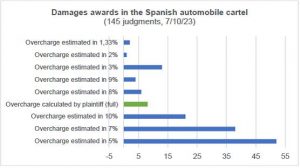
Generally, the courts tend to stick to the same judicial estimation for all the claimants that meet the evidentiary threshold (f.e., all the courts in Barcelona have agreed 3%, ES:JMB:2022:12843 or ES:JMB:2023:1933, the amount would be 5% in Madrid ES:JMM:2023:478, Albacete ES:JMAB:2023:933; Badajoz ES:JMBA:2023:1831, Burgos, Palencia, Palma de Mallorca ES:JMIB:2023:1467, Bilbao ES:JMBI:2022:12470, Pontevedra 3 ES:JMPO:2023:331, Valencia 3, San Sebastian and Soria; 7% in Valladolid ES:JMVA:2023:2131, 8% in Gijón ES:JMO:2023:405 and 10% in Alicante 4, Pontevedra 1 ES:JMPO:2023:1224, or Murcia ES:JMMU:2023:701), but some courts have even estimated different overcharges for different defendants depending on their market position (cfr. ES:JMO:2023:1763 and ES:JMO:2023:1704).
In contrast with what has occurred with the litigation in the truck cartel, in which cases could always be appealed to the Courts of Appeal and to the Supreme Court, thereby explaining why there are over 2000 cassation appeals pending before the highest Court, in this case the situation is different. Judgments issued in oral summary proceedings cannot be appealed if their amount is less than €3.000 (see article 455.1 of Civil Procedure Act), so most of the commercial court rulings would be final (unappealable). Still, for those cases in which the amount claimed is larger than €3.000, appeals would be possible, and a few judgments by Court of appeals have already been issued.
| Court | Date | Parties | Rapp. | Reference | Outcome |
| Soria (sec. 1) | 5/6/23 | X v. BMW | R.Mª Carnicero | ES:APSO:2023:209 | Judicial estimation of overcharge 5% purchase price+ interest |
| Oviedo (sec.1) | 5/7/23 | N v. Ford | J.M. Raposo | ES:APO:2023:2226 | Judicial estimation of overcharge 5% purchase price+ interest |
| Zaragoza (sec. 5) | 5/7/23 | N. Opel España SL | A.L.Pastor | ES:APZ:2023:1208 | Judicial estimation of overcharge 7% purchase price+ interest |
| Madrid (sec.32) | 7/7/23 | J v. BMW Ibérica | A. Arribas | ES:APM:2023:11315 | No causal relationship/harm |
| Madrid (sec.32) | 21/7/23 | Maqueda Gallego y Alvárez SL v. Toyota | E. García | ES:APM:2023:13066 | Judicial estimation of overcharge 5% purchase price+ interest |
| Alicante (sec. 8) | 29/7/23 | M v. Mitshubishi | L.A. Soler | ES:APA:2023:915 | No causal relationship/harm |
Revival of paper envelopes cartel damages claims and an imaginative torpedo claim
After the 2013 CNC fine on the paper envelopes cartel (S/0316/10 Sobres de papel, rapp. Julio Costas), more than a dozen claims were filed by several companies, non-profit associations, and political parties. Their claims for compensation were partially upheld by both Audiencia de Madrid (sec. 28) and Audiencia de Barcelona (sec. 15), with a substantial divergence in the assessment of the expert reports quantifying the damage caused by the cartel and in the compensation awarded (while in Barcelona the cartel overcharge was calculated as 20%, in Madrid it was 9.43% based on the Compass Lexecom expert report for Adveo). So far, the different varying awards have not been reviewed by the Supreme Court in cassation.
| Claimant | Judgment by Audiencia Provincial (date, rapporteur, reference) | Amount (€) |
| Cortefiel | Barcelona 15, 10/1/20 (L Rodriguez) ES:APB:2020:59 | 407.755 |
| Misiones Salesianas | Barcelona 15, 10/1/20 (JMª Ribelles) ES:APB:2020:58 | 1.034.124 |
| Grupo Planeta | Barcelona 15, 10/1/20 (JMª Ribelles) ES:APB:2020:201 | 1.223.466 |
| CIFDSA | Barcelona 15, 13/1/20 (JF Garnica) ES:APB:2020:60 | 979.000 |
| Mutua Madrileña | Barcelona 15, 13/1/20 (JF Garnica) ES:APB:2020:186 | 190.819,18 |
| Manos Unidas | Barcelona 15, 13/1/20 (JMª Fernández) ES:APB:2020:185 | 275.904 |
| Caixa Ontiyent | Barcelona 15, 13/1/20 (M Cervera) ES:APB:2020:184 | 249.900 |
| Bankoa | Barcelona 15, 13/1/20 (JMª Fernández) ES:APB:2020:698 | 124.882 |
| Obras Misionales Pontif. | Madrid28, 3/2/20 (MP G Plaza) ES:APM:2020:1 | 132.200 |
| Cámara de Comercio | Madrid28 3/2/20 (MP A Arribas) ES:APM:2020:2 | 30.100 |
| PSOE | Barcelona 15 2/7/22 (MP: JF Garnica) ES:APB:2022:1182 | 3.589.787,69 |
| PSCAT | Barcelona 15, 27/10/22 (MP: L. Rodríguez) ES:APB:2022:9428 | 656.042 |
| ING | Barcelona 15, 3/11/22 (MP: M. Cervera, ES:APB:2022:11190 | 1.932.301 |
| IFEMA | Madrid 28, 3/6/22 (MP: A. Arribas) (ES:APM:2022:8164 | 279.677,61 |
| 10.126.958 |
Source: Prepared by the author based on CENDOJ
After the CJEU judgment of 22/6/22 (C-267/20 Volvo/DAF, rapp. A. Arabadjiev, EU:C:2022:494), the extension of the statute of limitations has led to other victims filing additional claims for an amount exceeding €27 million (orders of three commercial courts in Barcelona accepting -partially- access to evidence requested by these claimants are available at ES:JMB:2023:1196A; ES:JMB:2023:2116A and ES:JMB:2022:5570A).
As a reaction to these claims, and to many others that could be forthcoming (for amounts much larger, including one by Telefonica for near €80 million), one of the infringers has filed a declaratory action seeking juzgado mercantil 2 de Madrid to state that the claims against it are time-barred (Printeos et al v. Abanca, Axa Seguros, Banca Pueyo, BBVA, Bankinter, Barceló, Carrefour, CEPSA, Aulen, Editorial Aranzadi, Endesa, FC Barcelona, Ford, Gestión y Previsión de Pensiones, Globalia, Iberia, Línea Directa Aseguradora, Makro, Mercadona, Médicos sin fronteras, PRISA, Renfe, Fundación San Pablo CEU, Vodafone and Wolters Kluwer). The claim alleges the considerable uncertainty caused to the Printeos group by the future multi-million euro claims for damages arising from its participation in the paper envelopes cartel. Such situation endangers the management and future viability of the group, blocking it.
However, the potential time-barring of claims is a “burning nail” to be grasped when there is evidence that the overcharges existed, especially when the defendant has already had to compensate a dozen victims. It seems more likely that such torpedo claim would be aimed at «interfering» with the damages claims of the injured parties, and may delay and condition the claimants’ strategies (lis alibi pendens).
Milk processors cartel
In the last few years several claims for damages have been filed in relation to the milk processors carte, although most of them are still pending (with several rulings granting the prospective claimants access to evidence, see ES:JMB:2022:5177A; ES:JMB:2023:1437A; ES:JMB:2023:1802A; ES:JMB:2022:5790A; ES:JMB:2022:5376A; ES:JMB:2023:1414A; ES:JMB:2023:1417A). The CNMC resolution that uncovered and fined this cartel dates back to 2015 (S/0425/12 Industrias Lácteas 2), but its annulment by the administrative courts in judicial review has conditioned the outcome of the claims filed by farmers against the offenders (yet, there was a €2.011.225,13 damages award by juzgado mercantil 1 de Granada -Mª J. Fernández- of 30/6/21, SAT San Antón v. Puleva et al, ES:JMGR:2021:6331).
The CNMC fined the cartel again in 2019, with some variation in the “perimeter” of the infringement (S/0425/12 Industrias Lácteas 2). Only two judgments on the have been issued on the merits, all dismissing the claims, see judgments of juzgado mercantil 1 de Oviedo (A. Muñoz) of 20/1/22 (E. v. Danone, ES:JMO:2022:828) and juzgado de 1ª instancia 2 de Lugo (MªH. Bouso) of 3/6/22 (Ganadería Tres Pinos v. Grupo Lactalis et al, ES:JPI:2022:902).
Cardboard cartel: follow-down claims
Those harmed by the cardboard cartel face an even more difficult uphill struggle in their damages claims, as they follow a decision fully annulled by the courts. The CNC fine of €57.686.188 (S/0469/13 Fabricantes de papel y cartón ondulado) was quashed in court for the expiration of the time-limit of the investigation proceedings (see, f.e., ES:AN:2018:5371). Although the statute of limitations of the infringement prevented the CNMC for initiating a new proceeding to correct the mistake that led to the annulment of its first decision, businesses harmed by this cartel have sought access to the administrative file of the CNC (see Order of juzgado mercantil 10 de Barcelona -L. Orejas- of 23/11/22, Danone v. Cartonajes Europa et al., ES:JMB:2020:334A, confirmed by Audiencia de Barcelona -sec. 15- of 28/4/23 (MP: JMª Ribelles, ES:APB:2022:4486A)., which they will use as a basis for their stand-alone damages claims in court. Given the time passed since the cartel took place and given that it was known to its victims, it is unclear if potential damages claims could be time-barred. The CNC decision was adopted one and a half years (18/6/14) prior to the transposition deadline of the EU Directive on antitrust damages (27/12/16), but following the reasoning of the CJEU in C-267/20 Volvo/DAF, the applicability of its five year limitation period would require the court to consider that potential claims were not time-barred when the implementing measures were in force (Decree 9/17 of 26/5/17) that is 28/5/17.
Preventive damages litigation in the cable cartel
Offenders in the cable cartel are raising in the judicial review of the CNMC decision (S/DC/0562/15 Cables BT/MT) various questions regarding the content and scope of the binding nature of the authority’s decision in anticipation of future claims against them (article 75.1 of Spanish Competition Act). Two claims have already been filed in the commercial courts of Barcelona (Talleres Electrotécnicos de Pontevedra v. Nexans et al.; Iberdrola v. Prysmian et al).
Curiously enough, in the latter, Iberdrola claims €9.402.439 for the harm experienced as a customer because the market allocation between Amara NZero, Prysmian Group y Top Cable of the Proyecto Peñaflores (despite Iberdrola was held by CNMC jointly liable for the infringement as the owner of one of the infringers, see judgment of High National Court of 19/5/23, Rapp: M.D.S. Gandarillas, ES:AN:2023:2604). See Orders of Audiencia of Barcelona (sec. 15) of 10/2/23 (Rapp: J. F. Garnica, ES:APB:2023:2952A) and 21/2/23 (Rapp: L. Rodríguez, ES:APB:2023:2949A). Those High National Court rulingsblatantly indicate that the leniency beneficiary was unsuccessfully seeking to attack the CNMC’s finding that the cartel had effects on the market (ES:AN:2023:2599 and ES:AN:2023:2954)
Damages claims by public Administration
Finally, given that public administration and state-owned companies had been among those harmed by several cartels lately uncovered by the CNMC, it was only a matter of time before their claims for compensation of the overcharges paid were filed in court. In 2021 the railway network operator ADIF carried out a procedure to procure the legal services required to bring claims arising from the railway electrification and electromechanical cartel sanctioned by the CNMC in 2019 with a fine of over €102 million (S/DC/0598/16 Electrificación y Electromecánica Ferroviaria). Regretfully, ADIF aborted the process a year later when the Contracting Board obliged it to hire a different firm from its preferred one, see ABC 13/6/23 and El Economista 10/6/23).
More recently, the first lawsuit has been filed by the Health Service of an autonomous community claiming compensation for damages caused by the adult diapers cartel sanctioned by the CNMC in 2016 with a €60 million fine (Expansión 9/2/23). It is anticipated that other autonomous communities will follow suit.






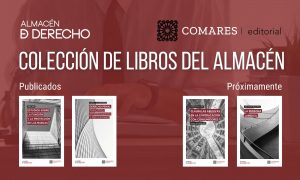

… [Trackback]
[…] Find More Informations here: almacendederecho.org/cartel-damages-claims-in-spain-lots-of-stuff-beyond-trucks-including-a-torpedo […]
[…] En el plano indemnizatorio (según la información disponible en CENDOJ) las Audiencias provinciales de Madrid y Barcelona se han pronunciado sobre 15 acciones interpuestas en dos oleadas sucesivas. Además, en una tercera tanda, las acciones emprendidas por Izquierda Unida y por el Partido Popular se han resuelto ya por los juzgados mercantiles 10 de Barcelona y 11 de Barcelona (respectivamente, sentencias de 19/2/24, ES:JMB:2024:31, y de 15/11/23, ES:JMB:2023:5704). Al menos quedan pendientes de resolución una demanda indemnizatoria de Telefónica de €79,12 millones y otra de Kutxabank de €7,38 millones; tramitándose también ante el juzgado mercantil 2 de Madrid una… Ver más »